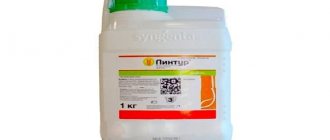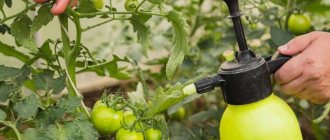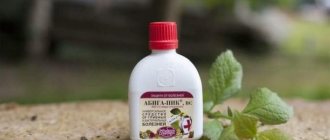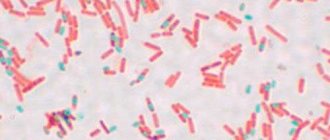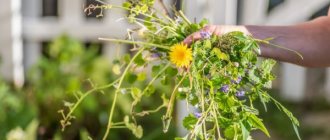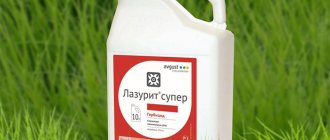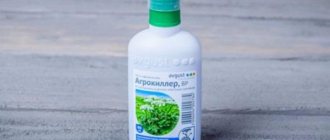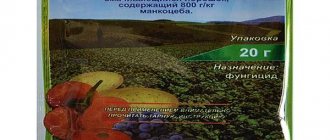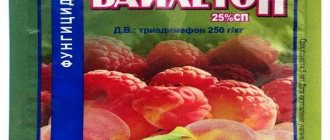Instructions for use
The drug is applied using any hand sprayer . Protecting the respiratory tract from entry is possible, but not necessary.
The better your sprayer, the easier it will be to apply the product.
Zenkor is easy to use, as it does not require special preparation of potato roots before processing. Planting occurs in the usual manner - preparing the soil, cutting furrows and planting tubers.
Reusable use of the drug during one gardening season, taking place in several stages, is allowed and encouraged.
Pre-emergence treatment
The first stage of processing should take place 2-3 days before the potatoes emerge. At this time, the dicotyledonous weeds should have already sprouted; the height of the sprouts should be at least 2 cm.
The dosage of the chemical directly depends on the quality of the soil; we try to adhere to the following recommendations:
- Light soil ( chernozem ) – up to 0.6 l/hectare.
- Average soil ( podzolic ) – up to 0.75 l/hectare.
- Heavy soil ( clayey ) – up to 1.2 l/hectare.
Immediately after applying Zenkor, a thin protective film is formed on the soil surface. It additionally prevents the germination of new weeds; it is recommended to preserve it for as long as possible.
To do this, it is better to refrain from loosening the soil and sprinkling (watering with a hose).
Post-emergence treatment
This stage can begin approximately 2 weeks after the first. It is more convenient to focus on the height of potato sprouts - the plants should reach at least 5 cm. Chemical consumption is less than at the pre-emergence stage:
- Light soil (chernozem) – up to 0.5 l/hectare.
- Average soil (podzolic) – up to 0.6 l/hectare.
- Heavy soil (clayey) – up to 0.8 l/hectare.
It is important to maintain the timing of the second treatment correctly . The effect of the drug should continue until the rows of tops are completely closed, which will hinder the development of the second wave of weeds.
Norms
The packaging with any herbicide preparation contains instructions that indicate how to dilute the drug and the application rate.
Zenkor is used taking into account the type of soil. On lighter soils, you will need to use smaller volumes of the product, but on clay soils, where viscosity and stickiness are observed, a larger amount of Zenkor will be required.
Proportions:
- on clay soils use 15 grams per hundred square meters;
- on ordinary soils - 10 grams;
- on light soils – 5 grams.
It is these standards that summer residents are guided by when cultivating their plots. The norms are given for five liters of water (solution per hundred square meters).
When using Zenkor on large areas of potatoes, the calculation is already in liters per hectare. So, before germination, treatment is done at the rate of 200 liters per hectare; after germination, the rate is the same, but the working solution will be less concentrated.
The number of treatments may vary, it all depends on the condition of the site and weed growth. Treatment options:
- pre-emergence treatment of potatoes (one-time);
- treatment before emergence, then treatment of potatoes during the initial growing season (twice);
- processing of potatoes after emergence (one-time).
Application standards must be strictly observed.
How to prepare the mixture
To prepare a mixture based on a chemical in the form of granules, you need to add 15 grams of powder to 5 liters of water, and complete dissolution occurs in 30 minutes. For the liquid variety, the consumption is 7-11 ml per 5 liters of water.
The drug requires dosing , which depends on the nature of the soil . The easiest way to carry out dosing is at the watering stage - prepare the mixture according to the given recipe, but adjust the volume of the chemical used when processing the soil.
The approximate consumption of Zenkor depending on the soil is given below.
Reviews about using Zenkor
"Zenkor Ultra" has earned grateful reviews because it is relatively safe, does not accumulate in the ground, and does not destroy cultivated plants. Experienced gardeners give good reviews for its effectiveness, convenient dosage and easy use. Consumers also like the form - powders, small granules that are easily soluble in water, and liquids. To prepare them, you simply need to pour the chemical from the bottle into a container of water and mix thoroughly. Another reason for good reviews about Zenkor is its low cost.
Early potato varieties
Zenkor can be used on all potato varieties without exception. However, to treat plantings of early and super-early varieties, it is necessary to carefully approach the dosage of the chemical.
completely abandon pre-emergence treatment in the case of cultivating the following varieties:
Related article: Is it necessary to pick flowers from potatoes - all the pros and cons
- Alyona.
- Ariel.
- Riviera.
- Bellarosa.
- Lark.
- Karatop.
Foliage chlorosis is one example of side effects from herbicide use.
It is extremely rare, but there are cases of slowing down the photosynthesis of potato sprouts after watering them with a herbicide. In this case, the disease is observed in the form of mild chlorosis, the color of the leaves slows down, and the plant develops more slowly.
Crops on light, sandy soils are most at risk.
Restrictions on use
Zenkor Ultra should not be used in extremely dry and hot weather due to evaporation. High humidity will not allow the drug to penetrate deep into the ground. Heavy rains can wash out the product and render it ineffective.
Exceeding the recommended dose will lead to deterioration in the quality of potatoes. Dark spots form in the fruits, the leaves turn yellow or white. The ends become dry and crumble.
You should not treat the soil with a herbicide if different potato varieties are highly sensitive to any herbicides. For grain plants with legumes planted, the product will be ineffective. If frequent frosts, sudden changes in weather, or drought are possible, you should discard the product. It is used with extreme caution when planting early potato varieties.
What is Zenkor herbicide
Zenkor is a chemical preparation for the control of dicotyledonous broadleaf and annual cereal weeds . Refers to selective herbicides, that is, selective action - does not harm cultivated plants.
Due to its relatively low cost, it is especially widely used for cultivating soil for planting potatoes, but can also be used for cultivating soil for tomatoes, carrots and other crops.
Zenkor is based on metribuzin, a widely used active ingredient in many fertilizers. It has a long-lasting effect, as it dissolves extremely slowly in water and remains in the soil for up to 3 months.
Completely safe for insects , including bees. The saturation of Zenkor with the element is very high:
- In liquid form – 600 g/l;
- In granules – 700g/kg.
It is important that harmful plants do not develop resistance to metribuzin, so its effectiveness remains at the same level every season.
Advantages and disadvantages
Advantages and disadvantages
The active substance easily penetrates into all organs of the weed plant. Both the roots and leaves of the unwanted neighbor are exposed to the herbicide.
"Zenkor" has the same effect on almost all types of weeds (cereals, dicotyledons, annuals). The effect is noticeable after 1-2 weeks.
The product in the form of an emulsion instantly dissolves in water. Thanks to this quality, it is possible to avoid clogging in the sprayer.
The herbicide is equally active in warm and cold climates.
Zenkor continues to act on weeds for a long time (6-8 weeks).
The herbicide actively affects the plant in any phase of development.
The drug is completely safe for humans.
The product is successfully used for preparing tank mixtures.
Low consumption of the drug.
When treating the area, the substance can be combined with pesticides.
The product should not be used in areas where garden plants grow. Crops react poorly to the substance under unfavorable conditions (drought, heat, stagnant water).
The drug is poorly effective on loose, humus soil.
When using the product you must follow safety rules.
Residues of the drug must be destroyed.
Operating principle
The effectiveness of the herbicide is high due to its complex effect on weeds - both through plant leaves (prevents photosynthesis) and on sprouts that have not yet emerged in the soil.
Re-germination is also prevented by a film that appears on the surface of the earth, which persists under favorable conditions for up to 2 weeks.
In the case of monocotyledonous weeds, you need to focus on the development of sprouts. This can be determined by eye - during the first tillage of the soil, harmful plants should be in the vegetative stage of development and have a couple of mature leaves.
Advantages
Zenkor compares favorably with other herbicides in its ease of use. All varieties have the following advantages:
- Pre-dissolution is not necessary.
- Efficient consumption.
- Sprayer filters remain clean.
- Complete dissolution of granules without sediment.
- No strong chemical odor.
- Convenient to dose.
- The liquid variety is a good base for making tank mix .
The chemical is completely safe for health. Complications from direct contact are extremely rare. If they occur, it is recommended to seek medical help.
Flaws
Unfortunately, the drug is not without its drawbacks. These include the ineffectiveness of the product on some types of soil, for example on light soil, the humus saturation of which is less than 2%.
Also, Zenkor is not suitable for beds operating on the principle of circular crop rotation with a change of crops every season. The reason is the incompatibility of the chemical with some garden plants , for example:
- Onion, lettuce, garlic.
- Peppers.
- All types of cabbage.
- All types of melons.
- Beet.
- Rape.
Disposal of chemical waste is a technically complex process. In the case of extremely small quantities, follow the basic rules: dispose of the remaining herbicide only in a deep hole away from water bodies.
In addition, disposal of Zenkor remnants or containers from it requires compliance with a number of conditions:
- It is necessary to construct underground burials in a remote location.
- It is prohibited to make burials near water bodies.
The most popular herbicides for potatoes
The modern market is extremely saturated with drugs of various effects. But even among the existing herbicides, there are several that are most loved by gardeners due to their ease of use and effectiveness. What preparation should I choose for processing potatoes?
Refers to selective herbicides, completely harmless for nightshades, carrots, and potatoes. The chemical is based on the substance metribuzin, which breaks down in the soil no faster than 3 months after treatment. The use of Zenkor is especially beneficial for the control of broad-leaved and cereal plants.
An important advantage of Zenkor is its saturation with the active substance - 600 g/l. In addition to damaging the sprouts, it leaves a protective film on the surface of the bed after application. Works great in mixtures as it is compatible with a wide range of insecticides and pesticides
Works great in mixtures as it is compatible with a wide range of insecticides and pesticides.
It has a selective effect; spraying should be done in the post-emergence period. The active ingredient is rimsulfuron, which blocks the process of acetolactosynthesis in the leaves. Equally effective against annual and biennial plants. The first signs of weed death are noticeable within 3 days, and their complete death occurs no later than 15 days after treatment.
Titus is suitable for preparing tank mixtures, but is incompatible with phosphorus insecticides. It is very demanding on humidity - in case of prolonged drought, the consumption of the chemical should be increased. May cause temporary yellowing of potato leaves. Not recommended for use on seed bushes.
Lapis lazuli is a universal product used for both pre-emergence and post-emergence treatment of beds. The principle of action is similar to Zenkor - the main substance is also metribuzin (700 g/l).
One of the most powerful drugs, used strictly once per season, only in exceptional cases is double treatment allowed - before germination and after, when the potato sprouts have reached a height of 10 cm or more
Lapis lazuli should be handled very carefully - contact with skin, mucous membranes, eyes or food can worsen a person’s well-being
Types of Zenkor
The drug has been used by gardeners in many countries for quite some time, its effectiveness has been widely recognized.
A common type of chemical in the past, Zenkor WG 70, was produced in the form of granular powder.
The dosage form is different - both products are available in the form of a powder or a liquid suspension concentrate. The latter has the following advantages compared to powder:
- Less long process of diluting the mixture.
- Improved solution stability.
- Absence of any sediment in the container.
Related article: Bicol for potatoes against Colorado potato beetles: instructions
The composition of chemicals does not differ depending on their subtype, nor does their effectiveness. Zenkor is supplied in various containers :
- Powder packets – 20 g.
- Bottles – up to 100 ml.
- Tanks – up to 5 l.
Packages of larger capacity are used for processing large farms, small ones - for household plots.
Composition and release form of the drug
This remedy has been used for a long time; its active substance is Metribuzin, classified as a triazine. The main effect of the drug is to suppress photosynthesis. The product is produced in the form of powder for wetting, instant granules and concentrated emulsion. Granular and powdered “Zenkor” is packaged in bags weighing 20 g, durable bags of 20 kg.
The liquid form is packaged in 20 and 100 ml bottles and five-liter canisters. "Zenkor Ultra" is a herbicide with an improved composition and a high concentration of the active element.
The instructions for use included with each package will help you use Zenkor herbicide correctly. Compliance with application rules guarantees high efficiency in weed control.
The herbicide "Zenkor" has a wide spectrum of effects on plant parasites
Compatibility with other tools
Zenkor is successfully used in the preparation of mixtures with the addition of a pesticide. However, it is not compatible with some types of fertilizers, it will be useful to remember the following tips:
- It is prohibited to use the herbicide together with any nitrogen fertilizer .
- Mix with insecticides carefully.
- When mixing with sulfonylurea, a special order for adding ingredients - Zenkor is mixed last and into the already infused mixture.
It is recommended to use the drug in conjunction with the manufacturer's products.
Zenkor can be successfully used in any climatic conditions and on most soils. The price/quality ratio makes it one of the most effective herbicides in existence.
How to use weed control for potatoes
Gardeners often have to deal with the growth of weeds on the site. Using Zenkor on potatoes will help quickly eliminate different types of weeds.
How to use weed control for potatoes
Herbicides are designed to effectively control pests. They have a neutral effect on the soil. The taste and quality of vegetables does not deteriorate from them. They are easy to use. After using them, the land does not need to be fertilized for the next year.
Security measures
When working with the herbicide, use protective clothing, protective gloves, goggles, a bandage or a respirator. Don't neglect precautions. Despite its relative safety, Zenkor is a toxic pesticide and requires careful use.
In case of contact with skin, rinse affected areas with plenty of clean water. If you accidentally swallow the solution, induce vomiting, take activated charcoal and be sure to consult a doctor.
Characteristic
Zenkor is a broad-spectrum drug. It is used for various garden crops: tomatoes, soybeans, carrots, apple trees, pears, etc. But it gives the best results for potatoes. It is rational to use it on large fields.
According to the instructions, it has the following characteristics:
- spectrum of activity of the drug - annual dicotyledons, cereal weeds;
- systemic nature of the action;
- suspension concentrate (liquid creamy solution) or in the form of water-soluble granules;
- The minimum exposure temperature is 10°C, the maximum is 35°C.
The product is produced in Germany and stored at room temperature so that it is not exposed to sunlight.
1 package can contain 20 or 100 g, if these are bottles. For home use, 5-20 granules weighing 20 g each are enough. The active ingredient is metribuzin.
The effect of the drug depends on its components. The main components of Zenkor Ultra are active chemicals.
Metribuzin inhibits electron transport in photosynthesis of plant pests. Subsequently, the weeds die and dry out.
The duration of exposure is explained by the ability of metribuzin to penetrate leaves and roots. Other herbicides are limited to the roots, which is sometimes not enough for weed control.
Description of the product "Zenkor Ultra"
Important properties of the drug "Zenkor Ultra" help gardeners quickly get rid of weeds. They make it possible to use this drug both at a private dacha and on plantations on an industrial scale. Practice has shown that it is most effective on potato plantations.
Important action: it does not interfere with the growth of the main crop on the field, potatoes grow and prosper, only the growth of weeds is inhibited, regardless of the growth phase - even in the form of ungerminated seeds. The very first treatment of the field completely removes all weeds from the area.
Zenkor creates a protective film on the ground that prevents the growth of weeds in the treated area. Film - protection lasts a long time, thanks to it, cereals and broad-leaved weeds are destroyed. The active ingredient of “Zenkora” is Metribuzin, known to agronomists and earthen technicians. Its safety for growing food crops has long been proven and time-tested.
The property of Metribuzin is to affect the plant in all its forms of growth - through the root system, the herbicide, affecting the roots, enters the sprouts, affecting the entire plant that has managed to grow. Or, when Metribuzin gets on the foliage of an adult plant, it destroys them, and then penetrates into all parts of the plant, also having a detrimental effect on them. Chemical class of active substance: triazinone derivatives.
Zenkor is also used as part of a garden mixture against weeds. Several herbicides are mixed in the tank; the addition of Zenkor enhances the spectrum of action of the tank mixture. The herbicide is effective only until the potato rows close in an even carpet of foliage.
Need to know! The active component of the drug, Metribuzin, according to the classification of the Ministry of Health, is classified as a hazard class III for humans, and a hazard class IV for bees.
Composition of the drug Zenkor Ultra
The main substance that is part of the drug "Zenkor Ultra" and ensures its effect is metribuzin. Its chemical formula is C8H14N4OS. A substance from the chemical class of triazinone derivatives. Metribuzin in Zenkor is contained in a percentage ratio of 7:10, that is, 70%. In dissolved form, Zenkor contains 600 g/l of active substance.
The composition of the chemicals in the packaging does not differ by subtype, as well as their effectiveness. Zenkor is available for sale in different packaging:
- powder in bags of 20 g;
- in bottles up to 100 ml;
- in tanks up to 5 l.
Accordingly, large-volume packaging is purchased by farmers for processing large-area plantations; small-sized packaging is produced specifically for use in summer cottages and household plots in rural areas.
Note! The packaging allows you to conveniently dose the drug for work on a large plantation or in a small summer cottage. The liquid form of the drug is an excellent basis for preparing the mixture in tanks.
Advantages of the drug Zenkor Ultra
The action of Zenkor and its long-term preservation on the surface layers of the soil allow you to use this product after spring rains, and be sure that the protection against weeds will last throughout the season.
The drug "Zenkor Ultra" has a lot of advantages:
- the weed does not develop an addiction to it;
- easy to use;
- no pre-dissolution required;
- it can be used in different climatic zones of the country;
- efficient spending;
- the filters of the spraying apparatus remain clean;
- the granules dissolve completely, without sediment;
- perhaps spraying plantations, beds on freshly plowed, just sown soil, and already at the emergence of seedlings;
- The herbicide does not have a pronounced odor.
A special advantage among all those available from Zenkor Ultra is the absence of danger to humans and beneficial insects. The product does not disturb the phytohealth of neighboring crops and does not cause toxicity to them.
Important! On large garden plots and dachas, crop rotation is always planned. The use of herbicides containing Metribuzin does not interfere with crop rotation plans.
Toxicity of Zencor
Research has proven that any herbicide should be used strictly according to its instructions for use. Then a high harvest will be obtained and there will be no negative effect on vegetables and human health. Zenkor does not accumulate in the soil and is therefore considered completely safe, despite its intimidating name “herbicide”. It is scary for those who are unfamiliar with modern weed control products.
Drugs of the future! Constantly conducted scientific research constantly improves the level of safety, manufacturers are fighting for a niche in the market and producing products with a complete absence of harmful substances.
Features of the drug
The product destroys broad-leaved and cereal plant pests and is non-toxic to animals, people, soil and the environment.
Based on the instructions for use, the drug has a number of features:
- fights a large number of weeds;
- completely dissolves in water in 10-15 minutes;
- applied before and after potato germination;
- does not cause addiction to plant pests;
- it is possible to cultivate a large amount of land;
- used both independently and together with pesticides;
- promotes soil cleanliness for at least 2 months;
- used as an agrochemical in the agricultural industry or private fields.
Thanks to Zenkor Ultra, crops grow quickly and receive enough water and light. The drug saturates the soil with nutritional and mineral components.
Related article: Box for storing potatoes in winter in the cellar and on the balcony
In accordance with the instructions, the liquid is mixed with other herbicides. This is necessary to enhance the spectrum of action. The solution damages the underground and above-ground parts of the potato and prevents the development of any mechanically transmitted viruses. The herbicide should not be applied to sandy soil. The leaves of the plant may turn yellow and fall off. The root will dry out slightly.
Preparing the soil before processing
Zenkor Ultra against weeds is used on previously prepared soil. The active ingredient of the drug is better absorbed in loose, moist soils. The earth is dug up, large breasts are broken, then the intended crop area is watered. The soil does not need to be moistened if it rains regularly in the region. In areas with arid climates, this preparation cannot be avoided.
Important! You cannot treat the soil with a herbicide before rain - the drug will be washed off with water, its effectiveness will be significantly reduced.
After the soil has been prepared in this way, it is treated with Zenkor, diluted in accordance with the instructions.
Effect of the drug
Zenkor destroys weeds that have already disappeared. After the drug they simply dry out. The next season the soil does not need to be tilled. In the future, the probability of weeds appearing in the next 3 months is zero. Treatment with the product will help when the plants have just begun to germinate.
The effectiveness of the action depends on the average air temperature, soil humidity, and soil type.
The herbicide creates a protective film on the surface of the earth and cultivated crops. After mechanical treatment of the soil, the shell is destroyed. This mechanism of action is implemented before the crops rise.
After germination, metribuzin has an active effect. Processing speed is a week or 14 days.
Zenkor does not increase yield, but prevents its decrease. To achieve the desired effect, be sure to follow the recommendations for use in the instructions.
What weeds are they used for?
Working without grass is much easier
Thanks to its wide range of applications, Zenkor copes with a large number of weeds. Their list:
- wild daisies;
- ambrosia;
- amaranth;
- dead nettle grass;
- rolls;
- yellow sow thistle;
- average chickweed;
- thin-legged, etc.
Zenkor shows low efficiency with a small amount of humus in the soil. It is also not recommended to use it against bindweed, black nightshade, creeping wheatgrass and bedstraw. If the pest plants are perennial, Ultra will not help.
When and how to spray
It is recommended to spray beet plantings at a temperature of +10-25°C. If the temperature regime is not observed, the drug can have a phytotoxic effect on the beets themselves: its growth will slow down, and the tips of the leaves will become brown. Such symptoms disappear after a week and will not affect the yield in any way.
Spraying after rain or heavy dew is also not recommended, since such treatment will not be effective.
Important! It is prohibited to resort to agrochemical treatment of plantings if the beets are in a stressed state, which is caused by unfavorable weather conditions (drought, frost). It is also contraindicated to spray the crop if the air temperature is below +10°C or above +25°C.
age of crop and weed:
- if 4 leaves appear on the crop and the weeds are at an early stage of growth, it is necessary to carry out a one-time spraying using 3 liters of herbicide per 200 liters of working solution;
- in the case when 2-4 leaves appear on pest plants, it is recommended to spray in two stages, calculating 1.5 liters of agrochemical per 200 liters of working solution. The interval between the first and second treatment should be 7-14 days;
- To get rid of weeds in the cotyledon phase, it is necessary to spray three times, with an interval of 7-14 days between each. Consumption of the drug is 1 l/200 l of working solution.
Doses are indicated per 1 hectare of crop area! The herbicide is compatible with any other pesticides (for example, Miura, Hacker, Pilot). A two-liter dose of the drug should not be used until 4 true leaves appear on the crop.
Important! You can begin manual work only a week after spraying with the drug. Mechanized processing can be carried out after 3 days.
Application
Initially, the soil must be leveled and broken into lumps. Zenkor is diluted with water. According to the instructions for use, the consumption rate for potatoes does not exceed 11 ml of the drug per 5 liters of water. This is enough for one hundred square meters.
The drug is sprayed using a sprayer. The main requirement is to distribute the product evenly throughout the entire area. The preparation should saturate the soil to at least 3 cm.
The dose depends on the type of soil. For heavy soils, take the maximum (11 ml), for light and airy soils - the minimum (5 ml).
If rainy weather is expected, treatment is carried out in the morning, 4-5 hours before the rain. Rain will moisten the soil and Zenkor Ultra will penetrate deep inside.
Recommendations
In order not to harm anyone during soil treatment with Zenkor Ultra, it is important to follow the advice:
- During dry periods, use the maximum permitted dose; during the rainy season, use the minimum dose.
- Use the product only in open ground. Soil treatment in greenhouses and greenhouses can activate phototoxicity.
- Follow the consumption norms - 200-300 ml per 1 ha.
- Do not throw any remaining product into open water.
If everything is done correctly, the suppression of weeds will be rapid, reaching the closure of the tops in separate rows.
Processing methods and times
To destroy weeds with potato herbicides, any of the existing spraying methods can be used:
- ordinary;
- fine-droplet;
- large-drop;
- aerosol.
It is not recommended to spray preparations during dry periods and during windy conditions. It is forbidden to exceed the dose so as not to harm the seedlings, otherwise the excess will flow off. To apply the drug, special equipment is used, for example, ground sprayer trailers. The optimal pressure for uniform spraying is considered to be a pressure in the equipment of up to 1.5 atmospheres; a special spray tip is needed.
If the weed vegetation has grown too dense on the site, treatment is carried out with continuous action chemicals in the spring during planting or before seedlings appear, and in the fall. After the potatoes sprout the first shoots, it is allowed to use herbicides that have a selective effect on the cultivated field.
A day or three before work, the soil should be watered; it should be slightly moist. They are treated on the same day, morning and evening; nothing can be done on the site for 14 days. During this period of time, the composition will penetrate the soil and begin to destroy weeds. On average, 5 liters of solution will be needed per hundred square meters of land. When choosing herbicides, it is necessary to take into account the extent to which the potato field is overgrown with unnecessary grass.
Consumption rates
Different manufacturers recommend their own consumption rates for herbicides, but the dilution method is similar, on average 40-80 ml per 10 liters of water. If weed plants have powerful and strong roots, you can add 100-120 ml of the product. For clayey and heavy soil, the concentration should be maximum. If the soil contains a lot of manure - minimal. After dilution, the solution is ready for use. More details are described in the instructions for use. When treating a potato field with herbicides, be sure to wear a respirator, goggles and gloves.
Contraindications for use
If there are insects or signs of disease on the potato bushes, the use of herbicides is prohibited. If this advice is not heeded, spraying will lead to the death of the plant. It is not advisable to use chemicals for small numbers of weeds. You need to keep in mind that there are potato varieties that are sensitive to herbicides, so before growing it is recommended to find out how the selected variety relates to chemical treatment.
Natalia. Samara:
If earlier I pulled out weeds with my hands, now I started using herbicides. It was especially difficult to fight bindweed; it constantly grew back. Right now I'm using Lapis Lazuli. I am very pleased with the results of the treatment.
Evgeniy, Barnaul:
From the very beginning of growing potatoes, we could not get rid of weeds in the field. After trying many methods and preparations, we purchased the herbicide Zenkor. Now we fight weeds exclusively with this type of drug. Quick effect and ease of use are guaranteed.
Using herbicides on potatoes helps control nuisance weeds. If you use them within reasonable limits, there will be much less work in the garden, but there is no need to rush to use them. It is best to first try to deal with weeds using known folk methods or manually. The herbicide should be selected wisely; the yield depends on it. If you have no experience, you should consult a specialist. He will help you choose the type of herbicide and calculate the dosage.
